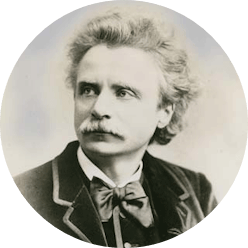
Edvard Grieg
15 de junio de 1843 - Bergen (Noruega) — 4 de septiembre de 1907 - Bergen (Noruega)
Acerca de
Edvard Grieg, a Norwegian in Leipzig
Edvard Grieg, an undisputed master of short pieces, was born into a cultured Norwegian family. His parents encouraged him to leave his homeland for Germany at the early age of fifteen to complete his education. He studied with Moscheles and Reinecke in Leipzig where he discovered the German Romantics and in particularly Scumann’s Piano Concerto played by Clara Wieck. In 1863, while travelling through Copenhagen, the composer met Niels Gade who encouraged him to seek out a middle road between Romanticism and Nationalism.
The scandinavian landscapes in Grieg's compositions
Back in Norway, Grieg decided to distance himself from the German Romanticism of his first works in order to concentrate on national folklore. His Lyric Pieces for piano commanded the admiration of both Franz Liszt and Johannes Brahms. His notoriety spread and his Piano Concerto (1868) launched his reputation as a composer recognised beyond the frontiers of the north.
Poetic and lyrical, Grieg’s style is best recognised in his short pieces, in particularly those written for the piano or voice. His writing was always melodic, his harmonies were never conventional, and he left behind numerous inspired pieces reflecting the landscapes of the north. Further to his encounter with Ibsen, Grieg composed the incidental music Peer Gynt (1875) from which he drew two Orchestral Suites bringing him international fame. Sometimes conventional in the bigger musical forms, (sonatas and concertos), Grieg’s music was always poetical and skilled with the discreet charms of momentary evocation.

